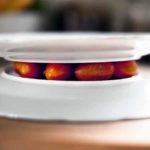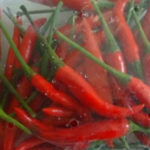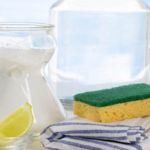Aluminum foil is a versatile tool in the kitchen, often used for food storage and cooking. Its ability to withstand high temperatures, heat, and abrasion makes it ideal for various culinary applications. Not only does it prevent food from sticking to containers, but it also protects cooking utensils, especially ovens and microwaves, from grease buildup.
Aluminum foil is commonly used in restaurants and households alike. However, experts believe that most people use it based on intuition and word-of-mouth recommendations without understanding the proper way to use it and the types of food suitable for foil wrapping.
Here are four common mistakes to avoid when using aluminum foil, as they can be detrimental to your health and may even cause fires and explosions, according to experts:
1. Using Aluminum Foil in the Microwave
Some people prefer to use aluminum foil when cooking in the microwave, believing it keeps the oven cleaner and helps retain more nutrients in the food. However, Grace Vallo, a British nutrition and culinary expert, refutes this practice as incorrect.

Using aluminum foil in the microwave can lead to fire and explosion hazards. (Illustrative image)
Lining the bottom of the microwave with foil may seem like a convenient way to keep it clean, but it interferes with heat distribution, resulting in uneven cooking. The same issue arises when food is tightly wrapped in foil, hindering even cooking.
Additionally, using foil in the microwave can block ventilation holes, causing a rise in temperature and creating sparks as the microwaves are unable to penetrate the foil. It is important never to place paper bags, plastic bags, or newspapers inside the microwave, as they can release toxic gases or catch fire at high temperatures.
2. Using Aluminum Foil with Acidic Foods
Cai Zhengliang, a master’s degree holder from the Taiwan Nutrition Association (China), advises against using aluminum foil with certain types of food. Specifically, acidic foods can react with the foil and should be avoided. These include:
– Vinegar and lemon.
– Tomatoes and tomato paste.
– Sauces and seasonings containing alcohol.
When aluminum foil comes into contact with these acidic foods during heating, the acid can corrode the aluminum and release aluminum ions, affecting the flavor of the dish and potentially causing harm to the body. Aluminum ingested into the body cannot be digested and accumulates in organs like the liver, kidneys, bones, and brain tissue.
High levels of aluminum in the body can lead to abdominal pain and fatigue. It also impacts our nervous system and has been linked to memory loss, anxiety, and asthma in patients with Alzheimer’s and depression.
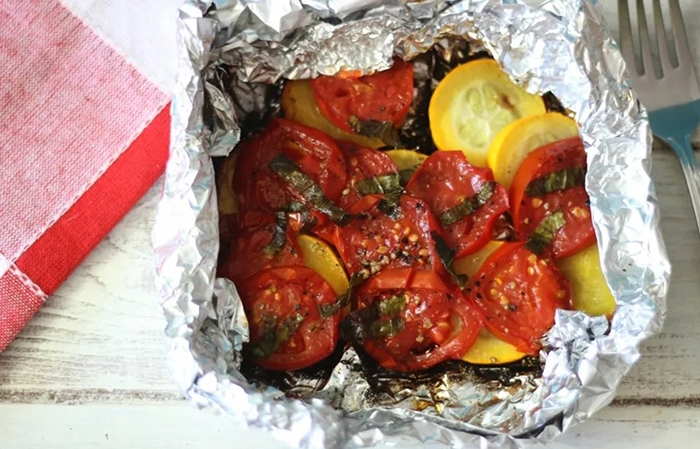
Avoid using aluminum foil with acidic foods as it can create toxic compounds. (Illustrative image)
Even if the foil is used for storage without heating, it can still cause chemical reactions that accelerate food spoilage and promote mold growth. Mr. Cai recommends cooking the ingredients first, removing them from the foil, and then adding vinegar, lemon, or tomato products. For storage, it is advisable to wrap the food in another layer of paper before using aluminum foil.
3. Using Aluminum Foil in Air Fryers
In recent years, air fryers have gained popularity, and with them, a common misconception about using aluminum foil. Cai Zhengliang emphasizes that lining the bottom or sides of an air fryer with foil is a harmful practice.
Contrary to popular belief, using foil in an air fryer does not improve cooking performance or speed. Air fryers work by heating food with hot air circulated at high speeds. While this hot air can remove oil from food, the foil can absorb the oil and potentially catch fire.
Placing foil at the bottom or around the sides of the air fryer increases the risk of fire and explosion. Additionally, if the food is too light, the high-speed hot air circulation can lift the foil, causing it to come into contact with the heating tube and ignite. Excessive use of foil can also damage the non-stick coating of the air fryer and hinder even cooking due to the heat distribution from the bottom up.
4. Using Aluminum Foil to Wrap Leftovers
It is a common practice to wrap leftovers in plastic wrap or aluminum foil before storing them in the refrigerator. This is especially true for foods served with sauces or those already wrapped in foil, as it seems convenient and prevents liquid from leaking. However, Lindsay Malone, a British nutritionist, warns against this practice, citing the potential for bacterial growth and increased risk of food poisoning.
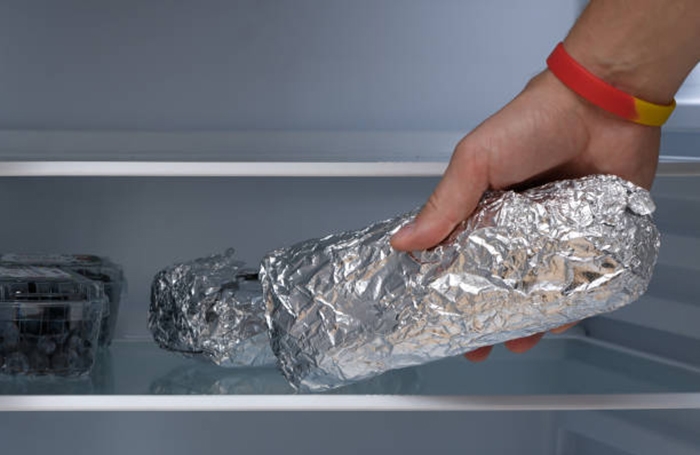
Avoid using aluminum foil to wrap leftovers, even when storing them in the refrigerator. (Illustrative image)
Malone explains that just as we need air to breathe, bacteria require oxygen to thrive. Certain bacteria, such as Staphylococcus aureus and Bacillus cereus, which cause food poisoning, produce toxins that are not destroyed by high cooking temperatures. When hot food is left at room temperature for more than two hours, bacteria can rapidly multiply. Using aluminum foil creates a similar risk as it does not completely seal the food from air exposure.
Instead, she recommends always storing leftovers in shallow, airtight containers to facilitate rapid cooling and prevent bacterial growth. Of course, it is essential to let the food cool to room temperature and then refrigerate it within two hours to maintain food safety.
Source: Vietnamnet – Translated by Phuong Nguyen
Ten Strategies to Streamline Your Cooking Process
Are you a busy housewife looking for ways to save time in the kitchen? Did you know that flossing can also help you out? Check out these 10 tips to help you quickly and easily prepare delicious meals for your family. Learn how to peel garlic in 10 seconds and cut cherry tomatoes quickly for a healthy and tasty meal.
4 Strategies for Storing Chili for One Month
Do you want to enjoy the fresh, spicy flavor of chili peppers all month long? Look no further! This article provides tips and tricks for storing chili peppers so that they stay fresh and flavorful for up to a month. Learn how to best preserve your peppers and savor their zesty taste for weeks to come.
Discover the Quickest Way to Clean Your Fridge for Tet in Under 20 Minutes
As we approach Tet, preparations for the New Year can seem endless. From cleaning the house to sorting through cabinets, it can be a taxing process. But perhaps the most dreaded New Year chore is refrigerators. No need to fret, though – with these helpful tips, you’ll have a clean fridge in no time – just 20 minutes!


























